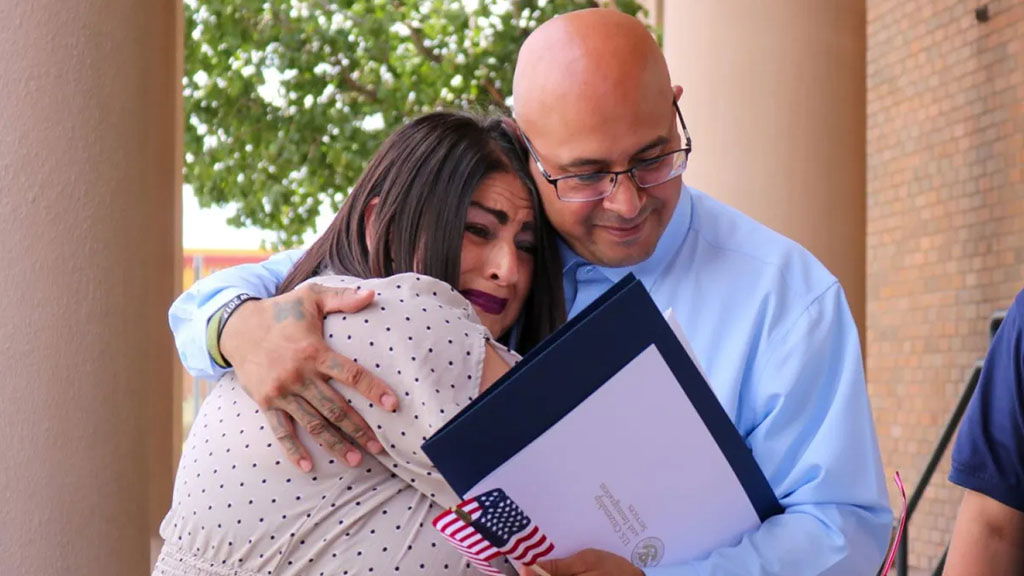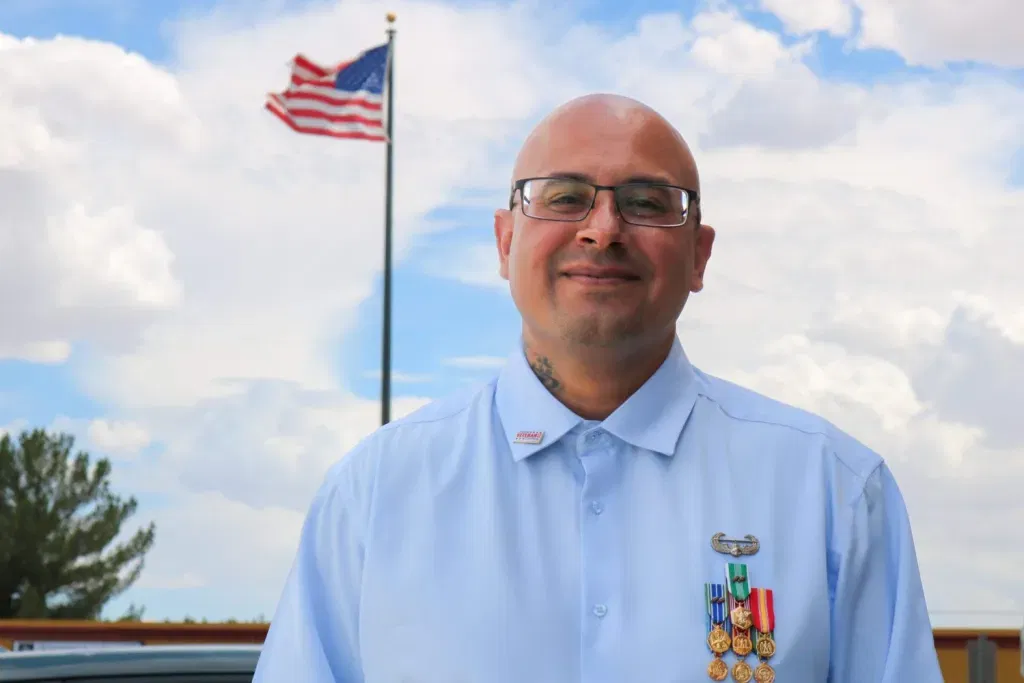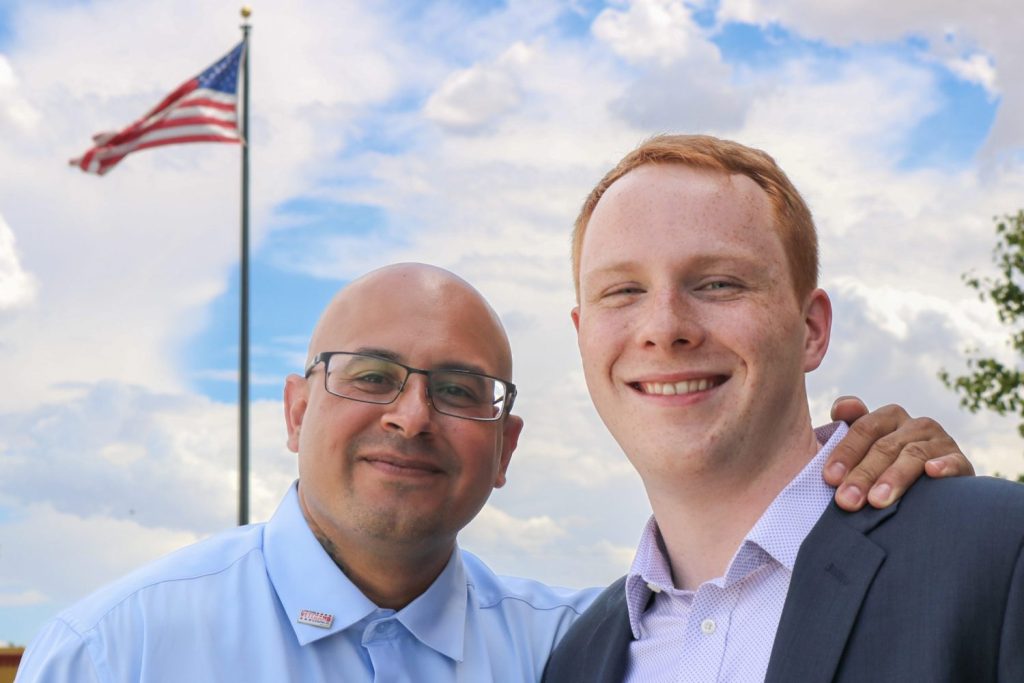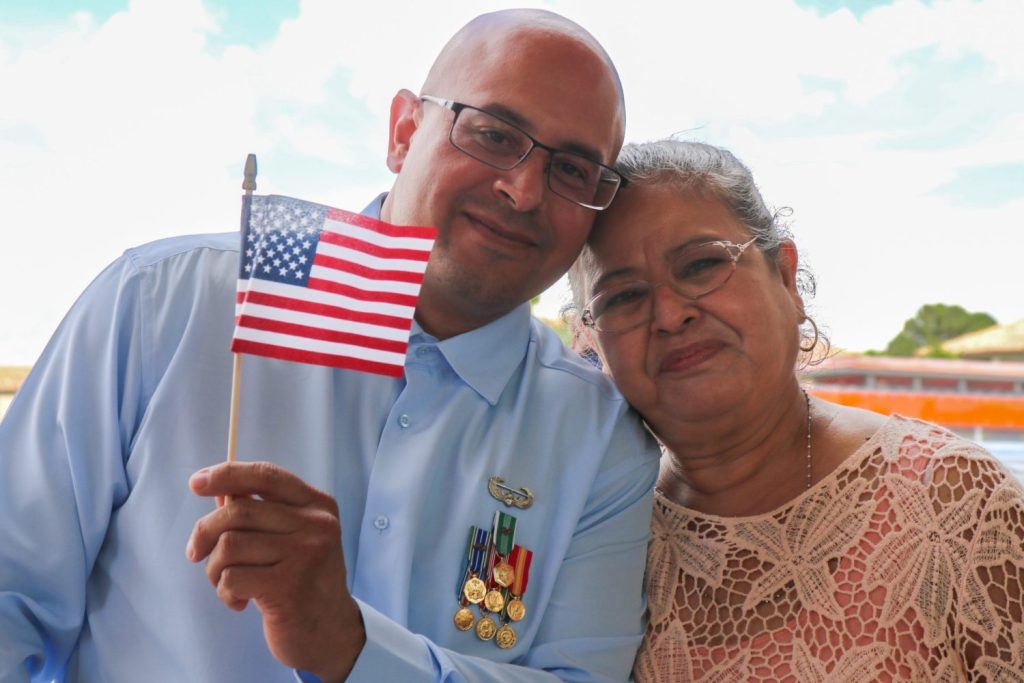Deported Army vet becomes naturalized US citizen

Editor's note: This story comes from El Paso Matters as part of the Puente News Collaborative, a group of newsrooms -- including ABC-7, which explores issues with a bi-national perspective. Story by Marisol Chávez.
EL PASO, Texas -- Ivan Ocon’s first moments as a United States citizen were met by a standing ovation and loud cheers from his friends and family.
The U.S. Army veteran, 45, was deported in 2016 and spent six years hoping to return to the only country he has ever called home.
“I can finally breathe,” Ocon said following his naturalization ceremony on July 7 in El Paso. “Now I have that freedom that I fought for.”
Born in Ciudad Juárez, Ocon moved to Las Cruces with his family when he was 7 years old. He entered the country legally and remained as a permanent resident. When he turned 18 and graduated from Oñate High School in Las Cruces, he joined the Army.
“I was already Americanized,” Ocon said. “I saw the U.S. as my country and I decided to serve my country.”
His service spanned from 1997 to 2003. He was deployed several times, served during Operation Iraqi Freedom and was awarded nine medals for his service.
Ocon was eligible for U.S. citizenship at that point, according to Nate Urban, a Yale University Law student representing him through the Yale Veterans Legal Services Clinic. Ocon had been in the military for more than one year and served during a time of conflict, which are both eligibility requirements under the U.S. Immigration and Nationality Act.
“It’s part of the recruitment pitch,” Urban said. “But many times their commanding officers aren’t trained on this … and they don’t know where to send them.”
Once Ocon got out of the Army, he never applied for citizenship. His post-traumatic stress disorder, stemming from what he describes as a near-death situation while deployed in Jordan, made it difficult for him to readjust to civilian life.
In 2007, Ocon was arrested on federal kidnapping and gun charges. After pleading guilty, he served nine years in federal prison, which Urban said was far less than the recommended sentence because Ocon was remorseful and willing to cooperate with the government.

On the day Ocon was supposed to be released, he was taken into custody by Immigration and Customs Enforcement and later, in February 2016, deported to Mexico.
“I didn’t think veterans, people who served this country, could be deported,” Ocon said. “I fought my case, but at the end of the day (U.S. Citizenship and Immigration Services) basically said, ‘Your service doesn't matter to this country, good luck in Mexico.’”
During the first few months after his deportation, Ocon was suicidal. For the longest time, he says, he wanted to put on his uniform, drive to the border and hang himself.
“I kept thinking the only way back was death,” he said. “It was a very traumatizing experience.”
It wasn’t until six months later, when he came across other deported veterans in Juárez, that he found his purpose and founded the Deported Veterans Support House.
He has helped at least two dozen veterans living in Mexico return home to the United States and get medical assistance and Department of Veterans Affairs benefits.
“I didn’t see myself coming home any time soon, so if I could help a brother come home, that meant I did something good,” he said.
The Union Veterans Council and the AFL-CIO became aware of Ocon’s work with other veterans and put him in touch with the Yale Veterans Legal Services Clinic in early 2021.
“We found out pretty quickly that his conviction was invalid and went from there,” Urban said.

Urban and his team filed a legal motion called a writ of coram nobis, which is used to correct a final judgment made by a court by fixing a fundamental error in due process.
“It’s a 15th-century common law writ deriving from merchants and merchant law,” Urban said. “It is an extremely rare writ; we have only been able to find isolated examples of this writ being granted and only under compelling circumstances.”
The fundamental error in Ocon’s case, according to Urban, was that the statute he was convicted under was struck down by U.S. Supreme Court rulings in 2018 and 2019 for being “unconstitutionally vague.”
The Supreme Court’s decisions prompted numerous lower courts to conclude that kidnapping does not constitute a “crime of violence,” according to the petition filed by Ocon’s legal team on Nov. 12, 2021.
“Because kidnapping is no longer a crime of violence, therefore, Mr. Ocon’s 2007 conviction for use of a weapon in furtherance of a crime of violence is no longer considered valid,” the petition to vacate his firearm conviction reads.
Although not fundamentally necessary, according to Urban, the withdrawal of Ocon’s firearm conviction might have helped his petition for military naturalization, filed in September 2021.
U.S. District Judge David Briones of El Paso granted Ocon’s petition and vacated his firearms conviction in late March.
On July 5, Ocon crossed the Bridge of the Americas for the first time in years to attend his naturalization interview.
Two days later, he stood inside the USCIS offices in El Paso to take his oath of allegiance.

Ocon’s mother, María Ávalos, hugged her son as soon as she walked in and saw him.
“Me siento bien agradecida (I feel very grateful). Our family and friends have kept him in prayer all these years,” Ávalos said. “We gotta keep working to help other veterans. I’m not the only mom struggling.”
About 30 people attended Ocon’s naturalization ceremony.
His sister, Claudia Ocon, 41, was among the emotional attendees.
“Deported veterans’ is an oxymoron. Those two words should not exist together,” Claudia Ocon said. “Any man or woman who risked their lives for this country should be able to live in this country freely and happily and legally.”
The Ocon family is determined to help other veterans who have still not returned home.
Ocon’s new citizenship is proof to him that anything is possible with the help of his network at Deported Veterans Support House in Juárez, the Repatriate Our Patriots organization and the Yale Veterans Legal Services Clinic.
“I was the test subject,” Ocon said. “We’re already making a plan to start helping other people out. The mission continues.”
Ocon plans to travel back and forth between Las Cruces, El Paso and Juárez as soon as he gets his passport to continue helping deported veterans return to the United States. In the meantime, he will focus on reconnecting with his daughter, who he has not seen in almost 16 years.
“The last time I saw her she was 3 years old,” Ocon said. “I want to repair that relationship that's been damaged by my deportation and incarceration. I've been there financially, always… but it's not the same as being there physically.”
This article first appeared on El Paso Matters and is republished here under a Creative Commons license.![]()

